
Volume XIV - Around Loreto
Clams & Wedgeshells
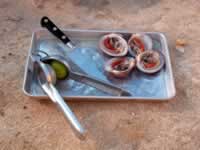 About
the time we moved north from Agua Verde into the Loreto area, the
water at last began get warm enough to get into, although our first
outings were still in 5mm wetsuits! At the same time we met Dennis
and Lisa of Lady Galadriel in Bahia Candeleros and were introduced
for the first time to chocolates. That’s cha-coh-LAH-tays, which is not a confection made from
cacao (although Dennis and Lisa also later introduced us to See’s,
a Californian chocolatier!), but rather a smooth, glossy-shelled
clam. About
the time we moved north from Agua Verde into the Loreto area, the
water at last began get warm enough to get into, although our first
outings were still in 5mm wetsuits! At the same time we met Dennis
and Lisa of Lady Galadriel in Bahia Candeleros and were introduced
for the first time to chocolates. That’s cha-coh-LAH-tays, which is not a confection made from
cacao (although Dennis and Lisa also later introduced us to See’s,
a Californian chocolatier!), but rather a smooth, glossy-shelled
clam.
Personally, I
haven’t been clamming since my Fire Island days,
back when I was a typical New York yuppie enjoying beach weekends.
And as for the Indiana boy…well, enough said. Clamming, Baja-style,
is usually done on snorkel, which makes it a bit of work. The first
trick is to learn to identify the siphon pattern. Chocolate clams
live buried an inch or two under the sand from where they extend
out two siphons, which are just visible side by side. The clam is
not always directly beneath the siphons, so this adds the second
bit of challenge whilst digging around while holding your breath!
Many cruisers cook their chocolates on the BBQ, but we like them
best raw with a squeeze of limón, a drop of picante sauce
and perhaps a dot of horseradish.
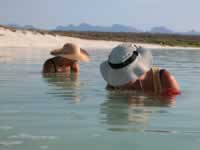 There are several
other almejas in the sands of the Sea: oversized amarillos (yellow
clams),
rough-shelled steamers, and my special
favorite – wedge shells. “Wedge shells” at least
is the name given to them by one popular cruising cookbook Cruising
Cuisine by Kay Pastorius. These tiny clams no larger than you
thumbnail are found in the first few feet of water on several soft
sand beaches.
One can sit waist deep and
cool off, while combing your fingers through the sand around you,
sifting these little guys out like gold nuggets. In an hour you can
collect a couple of cups worth, which when steamed are great to eat
straight from the shell or to add to linguine. It’s a wonder
of nature how much clam seems to be packed in those tiny packages. There are several
other almejas in the sands of the Sea: oversized amarillos (yellow
clams),
rough-shelled steamers, and my special
favorite – wedge shells. “Wedge shells” at least
is the name given to them by one popular cruising cookbook Cruising
Cuisine by Kay Pastorius. These tiny clams no larger than you
thumbnail are found in the first few feet of water on several soft
sand beaches.
One can sit waist deep and
cool off, while combing your fingers through the sand around you,
sifting these little guys out like gold nuggets. In an hour you can
collect a couple of cups worth, which when steamed are great to eat
straight from the shell or to add to linguine. It’s a wonder
of nature how much clam seems to be packed in those tiny packages.
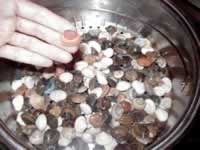 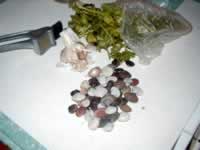 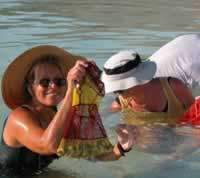
Linguine
with “Wedgie” (Clam)
Sauce (Serves Two)
2-3 cups of wedge
shells (depending on how much snacking you & your
shucker will do!), or about a cup of chopped larger clams, or 1 large
can of baby clams
1 cup water
¼ cup white wine or white vermouth (be sure to reserve the steaming
broth!)
3 cloves of garlic, minced
2 Tablespoons of olive oil
1 Teaspoon red pepper flakes
¼ cup of cilantro or parsley or both
¼
- ½ cup of reduced steaming broth (see above)
1-2 Tablespoons of cream (optional)
½ lb. linguine, cooked
grated Parmesan cheese
Start by rinsing the wedge shells to make sure they are free of sand
from collecting. It’s always best to let clams hang in salt
water a day to let them purge themselves of sand, although the
wedge shells seem to contain very little. The smooth shells are
so small, that scrubbing them is not really feasible. Steam them
over a steaming broth made of water and wine until they open (probably
about 3-5 minutes …keep watch!) Strain and reserve the steaming
broth.
Set your mate to picking the meat from the shells. Plan for attrition
as the wedge shell meat makes sweet, easy-to-sneak bites. (Save the
multi-colored shells for jewelry projects.)
Bring water to
a boil and cook the linguine. On our boat, the pasta pot is the
same pot
as the steamer. When al dente, drain the pasta,
and return to pan. My Italian friend says “Do not rinse pasta
or add olive oil to it as the sauce then can’t stick.”
While the pasta
is cooking, sauté the minced garlic in the
olive oil for about a minute. Add the red pepper flakes. Add the
clams and cilantro/parsley and stir until well coated. Gradually
add in the steaming broth. Thicken with a little crema (or sour cream)
and season with salt and pepper to taste.
Before serving, stir in about half of the sauce with the pasta and
toss to coat. Divide onto two plates and top pasta with rest of clam
sauce. Sprinkle with grated Parmesan.
Serve with green salad and break out the wine!
|